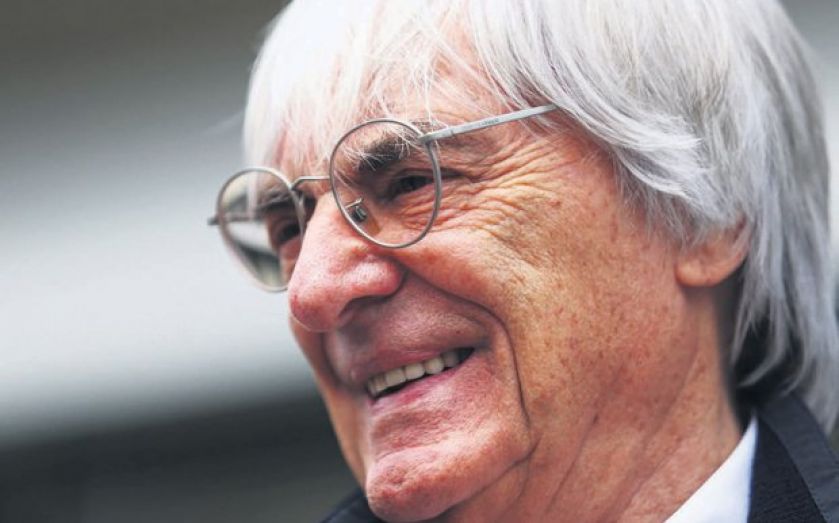Power steering

What happens when Bernie Ecclestone leaves Formula One?
HE IS one of Britain’s best-known chief executives, and over 40 years has transformed Formula One from an amateur pastime into a billion-pound business and the world’s most-watched annual sports series. Bernie Ecclestone has become a household name through his appearances on F1’s glitzy grid, and his poker face and Andy Warhol mop-top have become part of F1’s furniture. Eventually, however, that will have to change.
Ecclestone has built a £2.4bn fortune from selling stakes in F1 and one of the keys to his success has been staying at the heart of the action. He has been responsible for the most significant commercial decisions in F1, from the signing in 1981 of the first contract committing teams to race, to negotiations with Russian president Vladimir Putin about a grand prix in Sochi.
Unlike many other sports, F1 does not have an army of decision-makers. There is no chief marketing officer, no chief operating officer and no deputy chief executive. All of the sport’s big commercial decisions are under Ecclestone’s control and this has enabled F1 to act like a speedster rather than a juggernaut. With Ecclestone at the wheel F1’s revenues have grown by 31.7 per cent in five years to $1.6bn (£1bn) with net profits of $378m, boosting its value to over $10bn and since 1999 it has been sold four times.
Although Ecclestone now only has a 5.3 per cent stake, he has managed to remain chief executive. His focus is running the company rather than preparing for his departure and he has resisted attempts by F1’s controlling shareholder, private equity firm CVC, to groom a deputy.
David Campbell, the former European chief executive of entertainment group AEG, was hired in 2011 but left after little more than a year. More recently, headhunters were engaged to find a successor as part of plans to float F1 in 2012, but no one was appointed. Outgoing Sainsbury’s boss Justin King was said to be a candidate, as he is a racing fan, but Ecclestone says there is “no truth at all” to the rumour.
The closest F1 has to a successor is its chairman Peter Brabeck-Letmathe, appointed in 2012. However, he does not have hands-on experience running F1 and, as chairman of food and beverage group Nestle, is already busy.
Succession is a pressing problem as Ecclestone is not only crucial to F1 but he turns 84 this year. And age is not the only threat to his position.
Next month he is set to stand trial in Germany over a $44m payment made by him and his Bambino family trust to Gerhard Gribkowsky, a banker who sold F1 to CVC in 2006. German prosecutors claim the $44m was a bribe to steer the sale to CVC as it had agreed to retain Ecclestone as boss of the sport.
Ecclestone denies paying a bribe and says Gribkowsky threatened to make unfounded allegations about his tax affairs if he did not get the $44m. If Ecclestone is found guilty he could face imprisonment.
Regardless of when his successor is appointed, they will likely want to stamp their mark on the organisation. This is perhaps the most dangerous decision anyone could make. F1’s business model is like a cat’s cradle, with the links being agreements with competing groups such as teams, television companies, race tracks and even rival sports. Slight changes to any of these could cause discord with the participants and ultimately lead to the collapse of the structure.
The riskiest changes seem the most logical. F1’s ticket prices are some of sport’s highest, with the cheapest to the British Grand Prix costing £145 – more than a Wimbledon final or the last day of The Open. The prices are directly linked to the race hosting fees charged by Ecclestone, on average $28m per race a year.
Reducing fees would lower ticket prices and allow races to return to countries such as France, South Africa and Turkey. It sounds ideal in principle, but 44 per cent of F1’s revenue goes to the teams as prize money and hosting fees bring in the bulk of the cash. If fees decrease the teams will in turn get less, which could place some in jeopardy and encourage a breakaway.
Some argue the teams’ take should be increased because CVC is making too much from F1. On the other hand team prize money is F1’s biggest cost and yields five times more than CVC’s profit share, which is equivalent to 8.4 per cent of the sport’s revenues.
Prize money payments are not shared equally, with Ferrari alone receiving a guaranteed $100m – around 75 per cent of the entire budget of Caterham, the team thought to spend the least. Giving the teams equal rights may also seem logical but is a sure way of encouraging Ferrari to leave, which could be a catalyst for F1’s collapse.
Ferrari is so important to F1 that it can even veto Ecclestone’s successor if they have recently held a senior position at, or owned five per cent of, any team or manufacturer which either owns more than five per cent of a team or supplies engines to a team. No wonder that a source close to CVC believes Ecclestone’s successor “almost certainly has to come from externally”.
Perhaps his greatest strength is getting groups with competing interests to agree on decisions which ultimately benefit them all as well as the sport itself. The only way to guarantee a successor will be able to replicate this is if they continue to do precisely what Ecclestone does. Yet the only person who knows exactly what that involves is Ecclestone himself.
Additional reporting by Caroline Reid. Christian Sylt is the author of Formula One trade guide Formula Money.
www.formulamoney.com